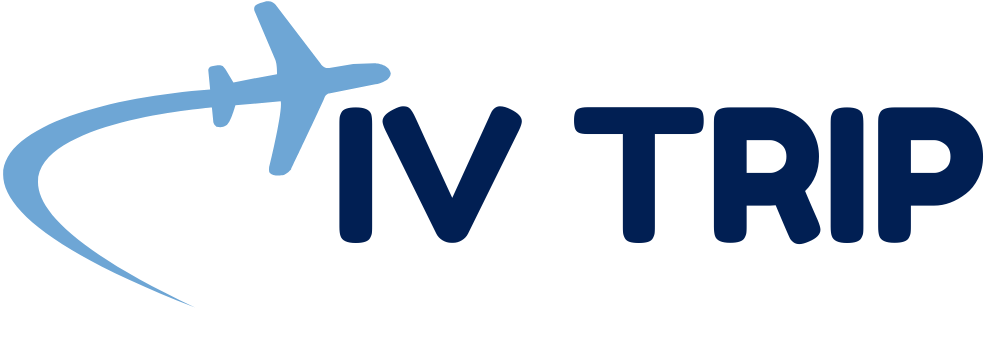Travel Technology Solutions for Scaling Agencies into OTAs

Smart travel technology solutions empower agencies to scale seamlessly into competitive OTAs with efficiency, reach, and innovation.
The travel sector is experiencing rapid growth, yet competition is sharper than ever. Modern travelers expect seamless, digital-first experiences, and agencies that fail to keep up risk falling behind. Travel technology solutions have become indispensable—streamlining bookings, managing customer relationships, and automating back-office tasks. With the right software, even a single agent can scale into a dynamic agency or build a successful online travel agency (OTA). This article highlights how software solutions for travel agency expansion can transform businesses of all sizes, featuring real-world examples and success stories from the IV Trip platform.
Travel Technology Solutions: Challenges for Solo Travel Agents and Small Agencies
Many independent travel agents rely on manual processes: spreadsheets, phone calls, and standalone supplier websites. This creates challenges when scaling. Solo agents and small agencies often face:
- Limited inventory and distribution. Without automation, agents must log into multiple Global Distribution Systems (GDS) or partner sites to check flight and hotel availability. Missing real-time data means lost sales.
- Cumbersome operations. Tracking bookings, invoicing clients, and managing payments manually is error-prone. Agents juggle spreadsheets for commissions, accounting, and itinerary planning, which slows response times.
- Fragmented customer management. Without a Customer Relationship Management (CRM) system, it’s hard to keep track of client preferences and history. Follow-ups, marketing campaigns, and personalized offers may fall through the cracks.
- Limited digital presence. Solo agents may lack a modern online booking portal or mobile app. In 2023, 72% of travelers preferred to book online versus only 12% preferring an agent. Agents without an OTA portal risk missing the majority.
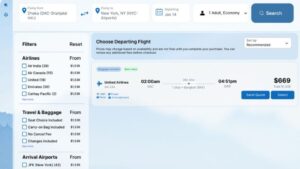
What Are Travel Technology Solutions?
Travel technology solutions are comprehensive software platforms designed specifically for travel businesses. They typically bundle multiple functions into one system, replacing fragmented tools. Key capabilities include booking engines (flights, hotels, tours), CRM, accounting, payment gateways, and analytics. In other words, the platform handles core agency operations “in one powerful, easy-to-use platform”.
- Real-Time Booking Engines. Integrations with Global Distribution Systems (GDS) and supplier APIs give agents live access to flight schedules, hotel rooms, and tour availability. For example, IV Trip connects to Sabre, Amadeus, Travelport, and local airline APIs to keep inventory updated. With one search interface, agents can compare options across multiple providers and instantly generate bookings or passenger name records (PNRs).
- Centralized Inventory. All bookings and packages are stored in a central system. This avoids double-booking and ensures that any team member can view the latest client itinerary. As one success story puts it, IV Trip “handles every aspect of our travel business—CRM, invoicing, bookings, and reporting” in a single place.
- Customer Relationship Management (CRM). Built-in CRM modules record client profiles, past trips, and communication history. They enable personalized marketing and faster service. Automation features can trigger follow-up emails or reminders automatically. One agency noted that the software’s CRM and invoicing “helps our team perform better and serve customers faster” by automating routine tasks.
- Accounting & Commission Tools. Travel software often includes financial modules for invoices, expenses, and commission calculations. Automated accounting cuts errors and saves time. For example, IV Trip’s Agency Accounting feature tracks all money in and out for tours and services, generating accurate invoice and commission reports without manual work.
- Marketing Automation. Modern platforms integrate email, social media, and promotions. They can segment customer lists and launch targeted campaigns automatically. This frees agents to focus on sales rather than admin.
- Mobile & Multichannel Access. Software is responsive and mobile-friendly. Agents and travelers can use the same portal or app from any device. IV Trip’s mobile app, for instance, is “a game-changer,” allowing agency owners to manage bookings and itineraries on the go. Multichannel distribution lets agencies publish services on an OTA site, social media, or partner portals, expanding reach.
- Analytics & Reports. The best systems include dashboards that show KPIs, sales trends, and customer data. Agencies can quickly see which packages are selling, revenue by destination, or customer demographics. This data-driven insight helps make smarter pricing and marketing decisions.
Travel software interfaces (like IV Trip’s flight search above) consolidate bookings and data in one platform. Modern travel technology solutions integrate flight and hotel availability in real time, eliminating manual searches and reducing errors.
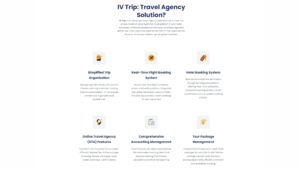
Key Features of Modern Travel Agency Software
Specific modules stand out when assessing software solutions for travel agencies. Leading platforms generally include:
- Integrated Booking Engines: One search box for flights, hotels, car rentals, buses, and package deals. Agents can bundle these into custom itineraries. Systems automatically connect to external content, so agents book in minutes.
- Custom Package & Itinerary Builder: Drag-and-drop interfaces let agents create dynamic tour packages (mixing flights, hotels, activities). This keeps offers fresh and personalized.
- Centralized CRM: Stores client profiles, past trips, and preferences. Enables targeted upsells and post-trip follow-ups. Built-in CRM automations nurture leads via email reminders or special offers.
- Automated Workflows: Invoicing, booking confirmations, and reminders are handled by the system. Agents spend less time on paperwork and more on selling.
- Analytics & Reporting: Real-time dashboards track performance. Users get insights like best-selling destinations, monthly revenue trends, and occupancy rates. For example, IV Trip’s analytics show which tour packages generate the most revenue, helping agencies adjust strategies.
- Multichannel Distribution: Software pushes inventory to OTAs, metasearch, or social channels automatically. This synchronization broadens reach and avoids double-booking.
- Payment Integration: Secure payment gateways with multi-currency support allow online credit card transactions. Clients can pay in their local currency, and agencies get automatic payment reconciliation.
- Mobile-First Design: In 2023, 65% of travel bookings were made online, and 35% of those via mobile devices. By 2025, mobile is expected to account for over 75% of travel bookings. Thus, software today is fully responsive. A mobile-friendly interface ensures high performance and a great user experience on any device.
Together, these features form a comprehensive ecosystem that “empowers travel agents to provide exceptional service”. By automating core tasks and centralizing data, agencies can handle more clients with the same staff – a critical scaling factor as they grow from solo operations to larger enterprises.
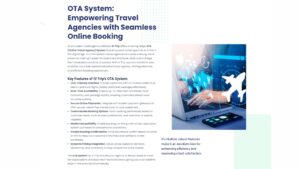
Scaling with Software: From Agents to OTAs
How does one go from a one-person agency to a full-scale OTA? The journey involves expanding inventory, markets, and service offerings – and technology is the enabler at every step. Here’s how travel technology solutions support growth stages:
- Automate Core Operations. The first step is to replace manual systems with software. A solo agent sets up a travel agency management system (like IV Trip) to manage bookings, customer records, and finances in one place. This eliminates spreadsheets and phone-ordering. One customer, the Travel Doctor agency, said moving “from spreadsheets to a fully digital setup…boosted productivity and improved the client experience significantly”. With ops streamlined, even a small team can handle more volume.
- Integrate Real-Time Content. As agencies grow, they need more inventory. Travel tech solutions integrate multiple GDS platforms and supplier APIs. For example, IV Trip’s software interfaces with Sabre, Amadeus, Travelport, and local airlines to provide real-time schedules and fares. This means an agent or OTA can instantly book hundreds of airlines and thousands of hotel options – a leap beyond manual or offline methods.
- Offer Multichannel Sales. Scaling agencies start to diversify sales channels. A travel platform allows an agency to launch its own public-facing OTA website or mobile app, in addition to servicing walk-in or corporate clients. The same backend drives bookings for all channels. One IV Trip client observed, “With IV Trip… I finally have full control over my agency’s performance. The reports, staff management tools, and dashboards help me make smarter decisions every day.”. This visibility is key when serving B2B partners and B2C consumers simultaneously.
- Add Advanced Tools. Larger agencies can take advantage of higher-tier features: a B2B portal for sub-agents, dynamic packaging engines, chatbot support, and AI-driven personalization. For instance, IV Trip includes marketing automation that can send scheduled email offers and social campaigns automatically. Agencies moving toward OTA status often add an integrated chatbot or recommendation system on their site to handle high query volumes.
- Ensure Scalability & Reliability. A growing OTA needs robust technology. Cloud-based SaaS platforms scale automatically as user demand grows, and updates (like adding a new airline or currency) roll out instantly. IV Trip’s cloud architecture means no on-site servers are needed, and performance remains consistent even as bookings surge. Because the interface is designed to be mobile-responsive, the system stays usable even when team members switch between desktop and smartphone.
- Focus on Data-Driven Strategy. At scale, data is everything. Consolidated reporting tools let managers analyze KPIs and spot trends quickly. A growing OTA can identify its best-selling destinations or customer segments and reallocate marketing spend accordingly. As one expert noted, travel technology platforms help “agencies make data-driven decisions, optimizing pricing and identifying new business opportunities”.
Agile travel software lets an agent become an OTA by integrating live inventory and customer data. The IV Trip interface above shows a real-time flight search on a mobile device, exemplifying how travel technology solutions deliver on-the-go booking flexibility. As agencies grow, these platforms centralize bookings, customer profiles, and finances in one app.
Travel Agency Software in Bangladesh: Localizing Travel Tech
In Bangladesh, the travel market is rapidly expanding. Recent surveys show over 60% of Bangladeshi travelers prefer booking online, and a staggering 85% of OTA bookings are via mobile devices. This local context makes travel technology solutions a true game-changer. Software tailored for Bangladesh includes local currency (BDT) support, integration with domestic carriers, and regional payment gateways.
For example, IV Trip – a Bangladeshi travel agency software – is optimized explicitly for local needs. It supports BDT currency and dynamic pricing and can be branded for the agency. It connects to both international GDS systems and local airline APIs, so agencies in Dhaka can book flights on foreign and local carriers seamlessly. The platform’s mobile app and website are fully bilingual (English and Bengali), ensuring end travelers feel at home.
Many local agencies have seen quick wins with these localized travel technology solutions. One CEO shared that IV Trip helped “shift from manual systems to a fully digital setup…modernized processes, boosted productivity, and improved the client experience”. Another agency’s MD highlighted that even with complex Bangladeshi fare structures and regulations, everything became “in one place and easy to use” after adopting software.
Building on this trend, travel tech companies in Bangladesh also offer B2B portals and specialized modules. A recent Implevista blog post explains that modern Bangladeshi agencies need a “powerful, integrated solution” to replace manual processes. As one local expert advises, choosing the right platform is “one of the most critical decisions” for a travel business. By selecting travel technology solutions designed with Bangladesh in mind, agencies can scale with confidence.
Software Solutions for Travel Agency Growth
How do travel technology solutions for agency growth translate into tangible benefits? Here are some key impacts:
Increased Efficiency: Automating bookings and back-office tasks frees up staff time. McKinsey reports that as tourism recovers, the agencies that adapt travel technology solutions will be best positioned to meet rising demand. Indeed, clients of IV Trip find that streamlined workflows let them serve more customers with the same team.
Enhanced Customer Experience: Centralizing customer data and automating communications leads to smoother journeys. Customers get instant booking confirmations, easy itinerary access, and timely updates. A satisfied IV Trip user noted their agency now provides “accurate, real-time bookings and seamless services”, which boosts trust and loyalty.
Faster Decision-Making: Analytics dashboards give managers real-time insights. Rather than spending days compiling reports, agency leaders can instantly see revenue by product or monitor staff performance. This agility allows quick pivots in strategy when market conditions change.
Greater Reach: Multichannel distribution means tapping into new markets without manual effort. A growing agency can syndicate its inventory to OTAs and partners automatically, expanding its customer base globally. One study notes that travel technology solutions streamline processes and increase cost-effectiveness, particularly when integrated with multiple sales channels.
Scalability: Cloud-based travel technology solutions scale with demand. Whether processing ten bookings or ten thousand, the platform adjusts. IV Trip’s SaaS model, for example, “minimizes upfront tech costs” and grows as the business grows. This pay-as-you-grow approach appeals to investors and startups since it reduces initial investment barriers.
Improved Compliance and Security: Software ensures data is stored securely, with encryption and permissions. Many platforms comply with international standards, such as PCI for payments. This reduces risk when handling sensitive traveler information.
In short, agencies that embrace travel technology solutions shift from firefighting day-to-day tasks to proactively expanding their business. The result is a stronger competitive position and readiness for future trends.
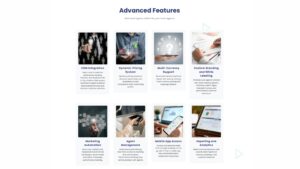
IV Trip in Action: Features and Client Success
IV Trip – Implevista’s travel agency software – exemplifies the power of modern travel technology solutions. It offers a complete, end-to-end package for agencies, combining all modules into one streamlined platform. Key features include:
- Real-Time Flight & Hotel Booking: Agents access live inventory from global GDS (Sabre, Amadeus, Travelport) and local carriers. The booking engine is “fast, responsive, and always synced”, even on mobile.
- Tour and Package Management: A customizable Holiday Packages module lets agencies create and upsell curated vacations. This dynamic packaging attracts more customers.
- Accounting & Commission Tracking: The system automatically calculates agent commissions and generates invoices, removing manual errors. Transparency here boosts satisfaction and loyalty.
- Marketing Tools: Built-in email and campaign tools help agencies send offers and reminders easily. Agencies can schedule newsletters or automate birthday greetings from the CRM.
- Multi-Currency & Multi-Language: Support for multiple currencies (including BDT) and languages (Bangla/English) ensures a global reach. These localized travel technology solutions allow customers worldwide to book in their currency.
- Mobile App: The IV Trip mobile app mirrors the web features. As one CEO said, “The mobile app is a game-changer. I can manage bookings, check itineraries, and respond to clients even when I’m on the go”.
Client Success Stories:
Real businesses attest to these advantages. Fto Travels (Bangladesh) reported that IV Trip “completely transformed how we manage our travel agency. From bookings to customer communication, everything is in one place and easy to use”. Another client praised the shift from spreadsheets: “IV Trip helped us modernize our processes, boosted productivity, and improved client experience significantly”. These stories prove how the right travel technology solutions don’t just add features—they drive real growth, efficiency, and confidence.
Future Trends in Travel Technology
Looking ahead, the role of technology in travel will only expand. Agencies moving toward OTAs should keep an eye on these trends:
- Mobile-First Booking: As noted, mobile devices will dominate travel bookings. Agencies must ensure their portals and apps are lightning-fast and user-friendly on phones. The IV Trip team emphasizes that by 2025, mobile will handle most bookings, making responsive design “foundational”.
- AI and Personalization: Travelers increasingly seek bespoke experiences. McKinsey highlights that customers “prefer travel on their own terms”. AI-driven tools (chatbots, personalized recommendations, predictive pricing) help agencies offer tailored suggestions at scale. For instance, integrating an AI chatbot on a travel site can handle FAQs and upsell deals 24/7. (Travel industry leaders predict ~98% see AI impacting their business soon.)
- Data and Analytics: With growth comes more data. Advanced analytics (even using AI) will help forecast demand and optimize prices. Agencies that leverage data will identify emerging trends quickly.
- Advanced Integrations: New APIs and marketplaces (like car-sharing or activity booking platforms) will be connected. Third-party integrations will become richer. In fact, a recent IV Trip guide emphasizes seamless API connectivity for “real-time booking accuracy” and automation.
- Sustainability Tools: Modern travelers care about sustainable options. Future software may include features to highlight eco-friendly hotels or calculate carbon offsets, aligning with consumer preferences.
- Voice and Chat Interfaces: Booking by voice (via intelligent assistants) or chat interfaces will become more common. Travel software with omnichannel support will engage customers on whatever platform they choose.
Agencies should choose a platform that’s built to adapt. IV Trip, for example, regularly updates to include trending features (like an upcoming AI module). By staying on a modern SaaS platform, agencies ensure they can plug into new tech without rebuilding from scratch.
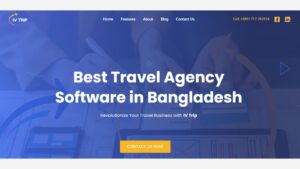
FAQs: Travel Technology Solutions
What are travel technology solutions?
Travel technology solutions are comprehensive software platforms designed to automate and manage core travel agency operations. They typically include booking engines (for flights, hotels, and tours), CRM, accounting, and more. These systems centralize workflows and integrate with GDS and suppliers, helping agencies automate bookings and customer management.
Why do travel agencies need specialized software?
Specialized travel technology solutions streamline complex tasks. They provide real-time inventory, automate invoicing, and track customer data in one place. This improves accuracy, saves time, and enables agencies (even solo ones) to serve more clients without extra staff. Leading solutions integrate flight, hotel, and tour booking engines with CRM tools, payment processing, itinerary planners, and reporting.
Can a solo agent use the same software as a large OTA?
Yes. Most modern travel technology solutions are scalable. A solo agent can start with core features (like a booking engine and CRM) and upgrade modules as needed. Since these solutions are often cloud-based, they come with different pricing tiers. As your business grows, you unlock more features and capacity, adapting from hundreds of bookings to thousands.
How do travel technology solutions help me scale my agency?
Travel technology solutions automate routine tasks and centralize data so you can manage more clients with the same team. They connect you to global inventory (flights, hotels), expand sales channels (your own site, social media, OTAs), and provide analytics to guide growth. Agencies that moved from spreadsheets to digital saw productivity boosted and customer experiences improved. These solutions free up time to focus on strategy and sales.
What is travel agency software in Bangladesh?
Travel agency software in Bangladesh refers to localized travel technology solutions built for Bangladeshi agencies. They support local currency (BDT), language, and regional regulations. For example, IV Trip is designed with dynamic pricing rules and local airline APIs. In Bangladesh’s growing market, where over 60% of travelers book online and 85% use mobile, having a modern, localized system is crucial for competing.
What features should I look for in travel technology solutions?
Key features of travel technology solutions include real-time booking (flight, hotel), custom package management, built-in CRM, accounting modules, payment gateway integration, and analytics dashboards. Also look for multi-currency support, marketing automation, and mobile responsiveness. A solution that bundles these “all in a single system” simplifies operations and drives scalability.
Are travel technology solutions expensive for new agencies?
Not necessarily. The cost of travel technology solutions varies, but many (like IV Trip) are offered as SaaS with tiered pricing. This eliminates large upfront license fees – you simply pay a monthly subscription. For startups, this is budget-friendly. In fact, launching an OTA portal often requires only a modest investment when using cloud-based solutions. Plus, the time saved on manual work usually offsets the cost quickly.
How secure is the data in travel technology platforms?
Reputable travel platforms use strong security measures. They encrypt data and follow industry standards like PCI compliance for payments. Data is usually stored in secure cloud servers with backups. According to IV Trip’s FAQ, they use “advanced security measures, including encrypted cloud storage” to protect business and customer data.
Can travel tech integrate with existing systems?
Yes. Most travel software offers API integrations. For instance, IV Trip can plug into popular GDS like Amadeus or Sabre, and connect with global payment gateways. You can also import data from existing accounting or CRM tools in many cases. This makes adoption smoother: the new system can talk to your old tools during the transition.
How do I get started with travel technology solutions?
Begin by evaluating your agency’s needs (booking channels, reporting, B2B or B2C focus). Then choose a platform with the features you need. Contact the software provider for a demo. For example, you can contact Implevista to see IV Trip in action, or subscribe to their blog for guides like How to Start an OTA with IVTrip. Starting with the right travel technology solution sets you on the path from a small agency to a thriving OTA.
Scaling from a solo travel agent to a dynamic online travel agency is challenging – but the right software makes it possible. Travel technology solutions centralize your operations, automate routine tasks, and unlock new sales channels. They turn limited resources into a competitive advantage. As one IV Trip customer put it, using software is the difference between “a few local bookings” and “a powerful, easy-to-use platform” powering the entire business.
If you’re ready to scale your agency, contact Implevista today. Explore our IV Trip travel agency software features and see how a cloud-based platform can transform your operations. Visit our blog for more insights, or contact us for a demo and personalized quote. Don’t let outdated processes hold you back—embrace travel technology solutions and unlock your agency’s potential.
